Mauricio Kagel - Maurico Kagel: Ludwig Van (1970/2020) [Hi-Res]

Artist: William Pearson, Carlos Feller, Bruno Canino, Frederic Rzewski, Saschko Gawriloff, Egbert Ojstersek, Gérard Ruymen, Siegfried Palm, Mauricio Kagel
Title: Maurico Kagel: Ludwig Van
Year Of Release: 1970 / 2020
Label: Deutsche Grammophon (DG)
Genre: Classical
Quality: FLAC (tracks) [96kHz/24bit]
Total Time: 52:17
Total Size: 923 MB
WebSite: Album Preview
Tracklist:Title: Maurico Kagel: Ludwig Van
Year Of Release: 1970 / 2020
Label: Deutsche Grammophon (DG)
Genre: Classical
Quality: FLAC (tracks) [96kHz/24bit]
Total Time: 52:17
Total Size: 923 MB
WebSite: Album Preview
1. William Pearson, Carlos Feller, Bruno Canino, Frederic Rzewski, Saschko Gawriloff & Siegfried Palm – Ludwig Van: Part 1 (25:56)
2. William Pearson, Carlos Feller, Bruno Canino, Frederic Rzewski, Saschko Gawriloff & Siegfried Palm – Ludwig Van: Part 2 (26:21)
Mauricio Kagel's Ludwig Van features an arrangement of fragments of Beethoven's works, modified as if heard by the deaf composer himself; it is distinct from Kagel's 1970 composition "Ludwig van, Hommage à Beethoven".
The work was commissioned by Westdeutscher Rundfunk for the bicentennial celebrations of the birth of Ludwig van Beethoven in 1970, in conjuction with a black-and-white film. The film examines the reception of the composer and his works and how he has become a consumer product of the culture industry.
A deconstructive analysis of the film investigated Beethoven as a cultural icon, revered yet exploited; the use and misuse of his works, including their appropriation to advance nationalist agendas; the difficulties and anxieties of influence performers face; Beethoven scholarship and attempts to "tame" the composer to accord with bourgeois ideals; and the difficulties of peering through the myths to catch a glimpse of the "real" Beethoven. Kagel uses the term Musealisierung or "musealisation" in speaking of the Beethoven cult, the term used by Theodor W. Adorno to indicate that "museums are the family sepulchres of works of art".
The work was commissioned by Westdeutscher Rundfunk for the bicentennial celebrations of the birth of Ludwig van Beethoven in 1970, in conjuction with a black-and-white film. The film examines the reception of the composer and his works and how he has become a consumer product of the culture industry.
A deconstructive analysis of the film investigated Beethoven as a cultural icon, revered yet exploited; the use and misuse of his works, including their appropriation to advance nationalist agendas; the difficulties and anxieties of influence performers face; Beethoven scholarship and attempts to "tame" the composer to accord with bourgeois ideals; and the difficulties of peering through the myths to catch a glimpse of the "real" Beethoven. Kagel uses the term Musealisierung or "musealisation" in speaking of the Beethoven cult, the term used by Theodor W. Adorno to indicate that "museums are the family sepulchres of works of art".





![Trondheim Jazz Orchestra & Alf Hulbækmo - Skumringsbarda (2026) [Hi-Res] Trondheim Jazz Orchestra & Alf Hulbækmo - Skumringsbarda (2026) [Hi-Res]](https://www.dibpic.com/uploads/posts/2026-01/1768741554_cover.jpg)


